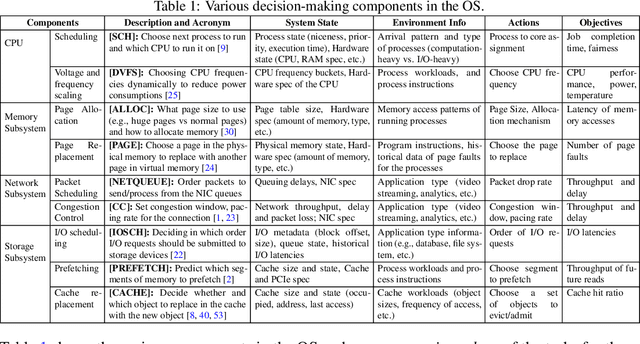Divyanshu Saxena
Vulcan: Instance-Optimal Systems Heuristics Through LLM-Driven Search
Dec 31, 2025Abstract:Resource-management tasks in modern operating and distributed systems continue to rely primarily on hand-designed heuristics for tasks such as scheduling, caching, or active queue management. Designing performant heuristics is an expensive, time-consuming process that we are forced to continuously go through due to the constant flux of hardware, workloads and environments. We propose a new alternative: synthesizing instance-optimal heuristics -- specialized for the exact workloads and hardware where they will be deployed -- using code-generating large language models (LLMs). To make this synthesis tractable, Vulcan separates policy and mechanism through LLM-friendly, task-agnostic interfaces. With these interfaces, users specify the inputs and objectives of their desired policy, while Vulcan searches for performant policies via evolutionary search over LLM-generated code. This interface is expressive enough to capture a wide range of system policies, yet sufficiently constrained to allow even small, inexpensive LLMs to generate correct and executable code. We use Vulcan to synthesize performant heuristics for cache eviction and memory tiering, and find that these heuristics outperform all human-designed state-of-the-art algorithms by upto 69% and 7.9% in performance for each of these tasks respectively.
C3: Learning Congestion Controllers with Formal Certificates
Dec 14, 2024



Abstract:Learning-based congestion controllers offer better adaptability compared to traditional heuristic algorithms. However, the inherent unreliability of learning techniques can cause learning-based controllers to behave poorly, creating a need for formal guarantees. While methods for formally verifying learned congestion controllers exist, these methods offer binary feedback that cannot optimize the controller toward better behavior. We improve this state-of-the-art via C3, a new learning framework for congestion control that integrates the concept of formal certification in the learning loop. C3 uses an abstract interpreter that can produce robustness and performance certificates to guide the training process, rewarding models that are robust and performant even on worst-case inputs. Our evaluation demonstrates that unlike state-of-the-art learned controllers, C3-trained controllers provide both adaptability and worst-case reliability across a range of network conditions.
CONGO: Compressive Online Gradient Optimization with Application to Microservices Management
Jul 08, 2024



Abstract:We address the challenge of online convex optimization where the objective function's gradient exhibits sparsity, indicating that only a small number of dimensions possess non-zero gradients. Our aim is to leverage this sparsity to obtain useful estimates of the objective function's gradient even when the only information available is a limited number of function samples. Our motivation stems from distributed queueing systems like microservices-based applications, characterized by request-response workloads. Here, each request type proceeds through a sequence of microservices to produce a response, and the resource allocation across the collection of microservices is controlled to balance end-to-end latency with resource costs. While the number of microservices is substantial, the latency function primarily reacts to resource changes in a few, rendering the gradient sparse. Our proposed method, CONGO (Compressive Online Gradient Optimization), combines simultaneous perturbation with compressive sensing to estimate gradients. We establish analytical bounds on the requisite number of compressive sensing samples per iteration to maintain bounded bias of gradient estimates, ensuring sub-linear regret. By exploiting sparsity, we reduce the samples required per iteration to match the gradient's sparsity, rather than the problem's original dimensionality. Numerical experiments and real-world microservices benchmarks demonstrate CONGO's superiority over multiple stochastic gradient descent approaches, as it quickly converges to performance comparable to policies pre-trained with workload awareness.
On a Foundation Model for Operating Systems
Dec 13, 2023

Abstract:This paper lays down the research agenda for a domain-specific foundation model for operating systems (OSes). Our case for a foundation model revolves around the observations that several OS components such as CPU, memory, and network subsystems are interrelated and that OS traces offer the ideal dataset for a foundation model to grasp the intricacies of diverse OS components and their behavior in varying environments and workloads. We discuss a wide range of possibilities that then arise, from employing foundation models as policy agents to utilizing them as generators and predictors to assist traditional OS control algorithms. Our hope is that this paper spurs further research into OS foundation models and creating the next generation of operating systems for the evolving computing landscape.
 Add to Chrome
Add to Chrome Add to Firefox
Add to Firefox Add to Edge
Add to Edge